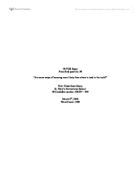IB TOK ESSAY MAY 2008
TO UNDERSTAND SOMETHING YOU NEED TO RELY ON YOUR OWN EXPERIENCE AND CULTURE. DOES THIS MEAN THAT IT IS IMPOSSIBLE TO HAVE OBJECTIVE KNOWLEDGE?
No it is possible to have objective knowledge. Experience and culture play a big role in understanding some sentence or for example other representation A. But it does not follow from this that we can’t know objectively whether A is correct or not. For example take A as a bit of arithmetic e.g an odd number. To understand it you have to call some background experience of type of numbers in mathematics. In short to understand this requires being inducted into a bit of mathematical culture. But the fact that your understanding of this claim relies mostly on mathematical culture, doesn’t mean that once you have understood you can’t acquire objective knowledge whether the claim is true.
Is it possible to understand without relying on experience and culture? This question differs from the above. It is possible to have objective knowledge but it is not possible to understand without relying on experience and culture. You have to have some cultural experience and then objective knowledge comes in later. In my own understanding and research all knowledge seems to have a subjective element and that there must be a knowing subject in order for something to be known. Hence objective knowledge is dependant on subjective knowledge.







